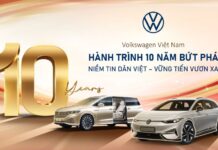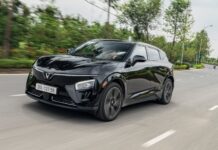Despite global trade fluctuations, electric vehicles remain on a robust growth trajectory, playing a pivotal role in the automotive industry. The shift towards electric mobility is becoming an inevitable global trend.
**20 million electric vehicles sold by 2025**
According to the International Energy Agency (IEA), global sales of electric vehicles reached 17 million in 2024, a surge of 3.5 million from 2023. In the first quarter of 2025, over 4 million electric vehicles (including plug-in hybrid electric vehicles – PHEV) were sold worldwide, accounting for 16% of total new car sales—the highest ever recorded in a single quarter and a 35% increase from the previous year. With this momentum, the IEA forecasts that total electric vehicle sales in 2025 will surpass 20 million.
In Europe, the top five markets (the UK, Germany, France, Italy, and Spain) witnessed a 30% surge in electric vehicle sales, with the UK and Germany leading the pack at 43% and 39% growth, respectively. Electric vehicles accounted for over 60% of new car sales in this region, with pure electric vehicles claiming a 17% market share. In Norway, thanks to VAT exemptions and widespread charging infrastructure, more than 9 out of 10 new cars sold are electric. The US saw a similar trend, with sales of pure electric vehicles surpassing 301,000, an 18% jump. In contrast, PHEV sales dipped by 11% due to changing eligibility criteria for incentives regarding battery origin.
Emerging markets are also witnessing impressive growth. India and Indonesia recorded a staggering 153% and 105% surge in pure electric vehicle sales in Q1, respectively. PwC attributes this surge to the introduction of affordable models and supportive government policies in developing countries. In Vietnam, VinFast delivered nearly 45,000 electric vehicles by the end of April, with VF 3, VF 5, and VF 6 as the top-selling models.
**Favorable Policies Fuel the Shift**
With the many benefits of electric vehicles and the global challenges of climate change and air pollution, electric mobility emerges as a pivotal solution to reduce greenhouse gas emissions and foster sustainable development. Nations worldwide are investing heavily in infrastructure, policies, and technologies to accelerate the transition from fossil fuel-powered cars to electric ones.
Indonesia has embarked on a $5.9 billion project to develop an electric vehicle battery ecosystem, aiming to make batteries more affordable for its citizens. Morocco has inaugurated North Africa’s first lithium-ion battery component factory for electric vehicles, a significant milestone in the region’s clean energy strategy. The EU has been at the forefront of phasing out fossil fuel-powered cars, with a ban on the sale of new gasoline and diesel cars from 2035. This regulation applies to all 27 member states, compelling automotive giants like Volkswagen and BMW to accelerate their electric vehicle production.
France has introduced an innovative “social leasing” program, offering electric vehicles for rent at just €100 per month for low-income earners. The Netherlands will only allow the registration of new zero-emission vehicles (including hydrogen and pure electric) from 2030 onward, effectively phasing out fossil fuel-powered cars. China’s electric vehicle strategy goes beyond environmental concerns, positioning itself as a long-term industrial powerhouse. With massive investments in the battery supply chain, charging infrastructure, and tech startups, China now dominates global lithium-ion battery production capacity and reshapes the automotive industry.
Malaysia has provided tax exemptions for imported electric vehicles and their components to encourage assembly within the country. Similarly, electric vehicles assembled in Vietnam are exempt from special consumption tax and sales tax for six years. These incentives, along with road tax exemptions, make electric vehicles more accessible and affordable.
India has set ambitious targets for electric vehicle adoption, aiming for a 40% share in the bus segment and 30% in personal mobility by 2030. Delhi’s decision to allow only new electric two-wheelers from August 2026 underscores its commitment to this transition. Electrifying public transport, particularly buses, is expected to bring about a significant transformation. With an estimated 2 million buses, mostly operated by the private sector, India’s electric vehicle market is projected to reach a massive $206 billion by the end of this decade, generating 50 million direct and indirect jobs nationwide.
In Vietnam, policies such as exemption from registration fees for electric cars from 2022 to 2027 are in place to facilitate this shift. VinFast is also doing its part by offering free charging until mid-2027, expanding its public charging stations nationwide, and introducing customer-centric policies and services to encourage the adoption of electric vehicles.
The momentum behind electric vehicles is undeniable, and governments worldwide are embracing this technology as a key driver of sustainable development. With sales projections of 20 million electric vehicles by 2025 and a potential global output of 68.1 million by 2030, according to PwC, the future of mobility is undoubtedly electric.
15 Electric Cars with the Best Resale Value After One Year in China: No Room for Japanese Autos
After 1 year of use, the Xiaomi SU7 retains almost 90% of its resale value. This impressive retention rate is a testament to the device’s enduring popularity and robust performance. With its sleek design, powerful features, and lasting value, the Xiaomi SU7 continues to be a top choice for consumers seeking a smart investment in technology.













































